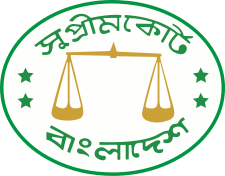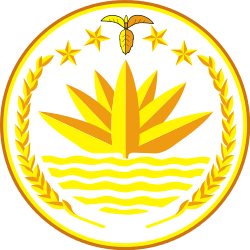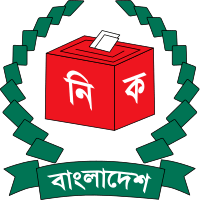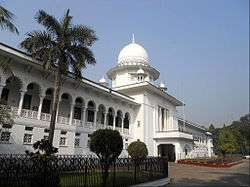Supreme Court of Bangladesh
| Supreme Court of Bangladesh | |
|---|---|
| বাংলাদেশ সুপ্রীম কোর্ট | |
 Supreme Court of Bangladesh Logo | |
| Country | People's Republic of Bangladesh |
| Location | Ramna, Dhaka 1000, Bangladesh |
| Coordinates | 23°43′51″N 90°24′09″E / 23.730777°N 90.402458°ECoordinates: 23°43′51″N 90°24′09″E / 23.730777°N 90.402458°E |
| Authorized by | Constitution of Bangladesh |
| Website | supremecourt.gov.bd |
| Chief Justice of Bangladesh | |
| Currently | Syed Mahmud Hossain |
| Since | 3 February 2018 |
 |
|---|
| This article is part of a series on the politics and government of Bangladesh |
|
Constitution and law |
|
|
 |

The Supreme Court of Bangladesh (Bengali: বাংলাদেশ সুপ্রীম কোর্ট) is the highest court of law in Bangladesh. It is composed of the High Court Division and the Appellate Division, and was created by Part VI Chapter I of the Constitution of Bangladesh adopted in 1972. This is also the office of the Chief Justice, Appellate Division Justices, and High Court Division Justices of Bangladesh. As of October 2018 there are 7 Justices in Appellate Division and 93 (75 are permanent and 18 are additional) in High Court Division.[1]
Structure
Supreme Court of Bangladesh is divided into two parts. First, the Appellate Division and second is the High Court Division. The High Court Division hears appeals from lower courts and tribunals; it also has original jurisdiction in certain limited cases, such as writ applications under Article 102 of the Constitution of Bangladesh, and company and admiralty matters. The Appellate Division has jurisdiction to hear appeals from the High Court Division.[2][3] The Supreme Court is independent of the executive branch, and is able to rule against the government in politically controversial cases.[4]
The Chief Justice of Bangladesh and other judges of the Supreme Court are appointed by the President of Bangladesh with prior mandatory consultation with the Prime Minister.[5] The entry point to the seat of judges in the High Court Division is the post of Additional Judge who are appointed from the practising Advocates of the Supreme Court Bar Association and from the judicial service under the provision of Article 98 of the constitution for a period of two years. The current ratio of such appointment is 80%–20%. Upon successful completion of this period and upon recommendation by the Chief Justice an Additional Judge is appointed permanently by the President of Bangladesh under the provision of Article 95 of the Constitution. The judges of the Appellate Division are also appointed by the President of Bangladesh under the same provision. All such appointments come into effect on and from the date of taking oath by the appointee under the provision of Article 148 of the constitution.[5]
A judge of the Bangladesh Supreme Court holds office until (s)he attains the age of 67 years as extended by the provision of Constitution (Thirteenth) Amendment Act, 2004 (Act 14 of 2004). A retiring judge faces disability in pleading or acting before any court or authority or holding any office of profit in the service of the republic, not being a judicial or quasi-judicial office or the office of the Chief Adviser or Adviser.[5]
A Supreme Court Judge is not removable from office except in accordance with the provision of Article 96 of the Constitution which provides for Supreme Judicial Council empowering it to remove a judge of the supreme court from office upon allowing the delinquent judge an opportunity of being heard. The supreme judicial council is constituted with the Chief Justice of Bangladesh and next two senior judge of the Appellate Division, provided if at any time the Council inquiring into the capacity or conduct of a judge who is a member of the supreme judicial council, or a member of the council is absent or is unable to act due to illness or other cause, the judge who is the next in seniority to those who are members of the Council shall act as such member.[5]
Supreme court judges are independent in their judicial function as empowered through article 94(4) of the Constitution.[5]
Judgments of Supreme Court of Bangladesh
As per Article 111 of the Constitution of Bangladesh, 1972, the Supreme Court judgments have binding effects and the article provides that the law declared by the Appellate Division shall be binding on the High Court Division and the law declared by either division of the Supreme Court shall be binding on all courts subordinate to it.
These judgements are usually digested in the Bangladesh Supreme Court Digest. There are also many law reports which publish the judgments and orders of the Supreme Court. All these law reports are in printed volumes. Only Chancery Law Chronicles offers the Online service of judgments of Supreme Court of Bangladesh.
Judges
Sitting Judges of the Appellate Division
| Name | Date appointed in Appellate Division | Date appointed in High Court Division as additional judge | Mandatory retirement | Appointing President at High Court Division | Prime Minister at time of appointment in High Court Division | Judicial position before appointment as Justice | Law school |
|---|---|---|---|---|---|---|---|
| Chief Justice Syed Mahmud Hossain | 23 February 2011 | 22 February 2001 | 30 December 2021 | Shahabuddin Ahmed | Sheikh Hasina (Awami League) | Deputy Attorney General | Dhaka University |
| Justice Md. Imman Ali[6] | 23 February 2011 | 22 February 2001 | 31 December 2022 | Shahabuddin Ahmed | Sheikh Hasina (Awami League) | Advocate at Supreme Court | Chittagong University; Dhaka University; Lincoln's Inn |
| Justice Hasan Foez Siddique | 31 March 2013 | 22 February 2001 | 25 September 2023 | Shahabuddin Ahmed | Sheikh Hasina (Awami League) | Advocate at Supreme Court | Chittagong University |
| Justice Mirza Hussain Haider | 8 February 2016[7] | 3 July 2001 | 28 February 2021 | Shahabuddin Ahmed | Sheikh Hasina (Awami League) | Advocate at Supreme Court | Dhaka University |
| Madame Justice Zinat Ara | 9 October 2018 | 27 April 2003 | 14 March 2020 | Iajuddin Ahmed | Khaleda Zia (Bangladesh Nationalist Party) | District and Session Judge | Dhaka University, Harvard School of Law |
| Justice Abu Bakar Siddiquee | 9 October 2018 | 30 June 2009 | 28 July 2021 | Zillur Rahman | Sheikh Hasina (Awami League) | District and Session Judge, Advocate at District Court | Rajshahi University |
| Justice Md. Nuruzzaman | 9 October 2018 | 30 June 2009 | 30 June 2023 | Zillur Rahman | Sheikh Hasina (Awami League) | Advocate at Supreme Court | unknown |
Sitting Permanent Judges of the High Court Division
- Justice Tariq ul Hakim
- Madame Justice Salma Masud Chowdhury
- Justice Dr. Md. Abu Tariq
- Justice Muhammad Abdul Hafiz
- Justice Dr. Syed Refaat Ahmed
- Justice Miftah Uddin Choudhury
- Justice A. K. M. Asaduzzaman
- Justice Md. Ashfaqul Islam
- Justice Zubayer Rahman Chowdhury
- Justice Moyeenul Islam Chowdhury
- Justice Md. Emdadul Huq
- Justice Md. Rais Uddin
- Justice Md. Emdadul Haque Azad
- Justice Md. Ataur Rahman Khan
- Justice Syed Md. Ziaul Karim
- Justice Md. Rezaul Haque
- Justice Sheikh Abdul Awal
- Justice S. M. Emdadul Hoque
- Justice Mamnoon Rahman
- Madame Justice Farah Mahbub
- Justice A. K. M. Abdul Hakim
- Justice Borhanuddin
- Justice Soumendra Sarker
- Justice Md. Moinul Islam Chowdhury
- Justice Obaidul Hassan
- Justice M Enayetur Rahim
- Madame Justice Dr. Naima Haydar
- Justice Md. Rezaul Hasan
- Justice Md. Faruque[8]
- Justice Md. Shawkat Hossain
- Justice F. R. M. Nazmula Ahasan
- Madame Justice Krishna Debnath
- Justice A. N. M. Bashir Ullah
- Justice Abdur Rob
- Justice Dr. Quazi Reza-Ul Hoque
- Justice Md. Abu Zafor Siddique
- Justice A. K. M. Zahirul Hoque
- Justice Jahangir Hossain
- Justice Sheikh Md. Zakir Hossain
- Justice Md. Habibul Gani
- Justice Gobinda Chandra Tagore
- Justice Sheikh Hassan Arif
- Justice J. B. M. Hassan
- Justice Md. Ruhul Quddus[9]
- Justice Md. Khasruzzaman
- Justice Farid Ahmed
- Justice Md. Nazrul Islam Talukder
- Justice Bhabani Prasad Singha[10][11]
- Justice M Akram Hossain Chowdhury
- Justice M Ashraful Kamal
- Justice S H Nurul Huda Jaygirdar[12][13]
- Justice K. M. Kamrul Kader
- Justice Mohammad Mujibur Rahman Miah
- Justice Mostofa Zaman Islam
- Justice Mohammadullah
- Justice Mohammad Khurshid Alam Sarker
- Justice A K M Shahidul Haque
- Justice Shahidul Karim
- Justice Mohammad Jahangir Hossain
- Justice Abu Taher Mohammad Saifur Rahman
- Justice Ashish Ranjan Daash[14][15]
- Justice Mahmudul Haque
- Justice Badruzzaman Badol
- Justice Zafar Ahmed
- Justice Kazi Md. Ejarul Haque Akondo
- Justice Mohammad Shahinur Islam[16]
- Madame Justice Kashefa Hussain
- Justice Syed Mohammad Mozibur Rahman[17]
- Justice Amir Hossain
- Justice Khizir Ahmed Choudhury
- Justice Razik Al-Jalil
- Justice Bhishmadev Chakrabortty
- Justice Md. Iqbal Kabir
- Justice Md. Salim
- Justice Md. Sohrowardi
Sitting Additional Judges of the High Court Division
- Justice Md. Abu Ahmed Jamadar
- Justice A.S.M Abdul Mobin
- Justice Md Mostafizur Rahman
- Madam Justice Fatema Najib
- Justice Md. Kamrul Hossain Molla
- Justice SM Kuddus Zaman
- Justice Md. Atowar Rahman
- Justice Khizir Hayat
- Justice Shashanka Shekhar Sarkar
- Justice Mohammad Ali
- Justice Mohi Uddin Shamim
- Justice Md. Riaz Uddin Khan
- Justice M Khairul Alam
- Justice S.M Moniruzzaman
- Justice Ahmed Sohel
- Justice Sardar Mohammad Rashed Jahangir
- Justice Khondaker Diliruzzaman
- Justice KM Hafizul Alam
Former Chief Justice Surandra Kumar Sinha was the first justice appointed from Monipuri or any minority Ethnic groups in Bangladesh. Justice Bhabani Prasad Sinha is also from the same community.
Madame Justice Nazmun Ara Sultana was the first ever female justice, and Madame Justice Krishna Debnath is the first female Hindu justice of Bangladesh. There are currently seven female justices in the supreme court.
Controversy
Former Chief Justice Mohammad Fazlul Karim withheld the oath taking of Justice Md. Ruhul Quddus (Babu) as he was involved in the murder of Aaslam, a pro-Jamaat-e-Islami Bangladesh student of Rajshahi University, on 17 November 1988, when he was a leader of Jatiyo Samajtantrik Dal (JSD), and Justice Mohammad Khosruzzaman was overtly involved in contempt of court on 30 November 2006.[18] Justice Nazrul Islam Talukder was the counsel of Captain (Rtd.) Qismet Hashem, one of the accused in Assassination of Sheikh Mujibur Rahman, the first President of Bangladesh, and the jail killing in 1975.
Justice Imman Ali is a British citizen,[6] which may preclude him from taking the post of justice in Bangladesh.[19]
Justice Shah Abu Nayeem Mominur Rahman, an appellate division judge, first ever among these judges, resigned on 12 May 2011 due to supersession, as he was presumed to be the Chief Justice of Bangladesh on 18 May 2011.[20]
Justice Mohammad Nizamul Huq resigned from the post of International Crimes Tribunal (ICT)-1 chairman on 11 December 2012 amid controversy for holding Skype conversations with an expatriate Bangladeshi legal expert based in Belgium.[21]
President of Bangladesh ordered for formation of a Supreme Judicial Council to investigate alleged misconduct of High Court judge Justice Mizanur Rahman Bhuiyan after he distributed copies of a 17 February The Daily Inqilab report, termed slain (on 15 February 2013) 2013 Shahbag protests activist and blogger Ahmed Rajib Haider was a moortad (heretic), among the justices of the Supreme Court of Bangladesh.[22]
Justice A B M Altaf Hossain was not confirmed as a permanent justice on 12 June 2014 despite recommendation from the Chief Justice of Bangladesh. So he has served legal notices to the top bureaucrats of Bangladesh government to reinstate him within 72 hours.[23]
Chief Justice Surendra Kumar Sinha resigned on 11 November 2017 from Singapore while on a leave, and transiting from Australia to Canada.[24]
See also
- Caretaker Government of Bangladesh
- First comprehensive online database of Bangladesh Laws Chancery Law Chronicles.
- Executive Magistrate of Bangladesh
Notes
- ↑ List of Judges in Supreme Court of Bangladesh; SupremeCourt.gov.bd
- ↑ Supreme Court of Bangladesh, Ministry of LPAP, Justice and Parliamentary Affairs of Bangladesh
- ↑ First Bangladesh Online Case Law Database, Chancery Law Chronicles- Database of Judgements of Appellate Division of Supreme Court
- ↑ Bangladesh, "Jurist Legal News and Research", University of Pittsburgh School of Law
- 1 2 3 4 5 Constitution of Bangladesh
- 1 2 http://www.amardeshonline.com/pages/details/2010/05/05/30393
- ↑ "10 HC judges sworn in". 26 March 2009. Retrieved 12 November 2016.
- ↑ "Appointment of 15 judges regularised". 12 April 2012. Retrieved 12 November 2016.
- ↑ "4 HC judges to be sworn in today". 15 October 2012. Retrieved 12 November 2016.
- ↑ "Jobs of 4 HC judges regularised". 10 December 2012. Retrieved 12 November 2016.
- ↑ BanglaNews24.com. "bangla news and entertainment 24x7 - banglanews24.com". Retrieved 12 November 2016.
- ↑ "News in Brief". 8 October 2013. Retrieved 12 November 2016.
- ↑ "bdnews24.com". Retrieved 12 November 2016.
- ↑ "5 addl HC judges sworn in". 12 June 2014. Retrieved 12 November 2016.
- ↑ "Justice Manik tasked with criminal cases". 15 June 2012. Retrieved 12 November 2016.
- ↑ "Newly appointed HC judges take oath". 6 August 2013. Retrieved 12 November 2016.
- ↑ "10 HC judges sworn in". 13 February 2015. Retrieved 12 November 2016.
- ↑ "Oath of 2 angers pro-BNP lawyers". 5 November 2010. Retrieved 12 November 2016.
- ↑ "cellflexi.com – cellflexi Resources and Information". Retrieved 12 November 2016.
- ↑ "CJ-hopeful Nayeem resigns". 13 May 2011. Retrieved 12 November 2016.
- ↑ "Remove Justice Nizamul from HC". 31 December 2012. Retrieved 12 November 2016.
- ↑ "Pro-BNP, Jamaat lawyers oppose president's move". 27 February 2013. Retrieved 12 November 2016.
- ↑ http://theindependentbd.com/index.php?option=com_content&view=article&id=221939:legal-notice-served-on-govt&catid=132:backpage&Itemid=122
- ↑ "President's office receives Justice Sinha's resignation". bdnews24.com. Retrieved 2018-03-20.


